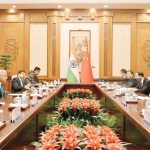An additional 250 more Central Industrial Security Force (CISF) personnel will soon be assigned to bolster security measures dedicated to safeguarding the Parliament House complex.
The fresh manpower boost in personnel is understood to be a component of CISF’s security framework specifically focused on protecting the Parliament.
In the latest enhanced security setup, more than 250 combined CISF personnel will be assigned to Parliament, with over 230 to be stationed within its security division and the rest allocated to the force’s fire department assigned to guard the Parliament.
As per sources, privy to the development, CISF Director General Nina Singh has given her approval for the integration of these personnel into the existing security wing of the force stationed at the Parliament.
The enhanced number of CISF personnel designated to bolster Parliament security are over 12 inspectors, 45 sub-inspectors, 30 assistant sub-inspectors, 35 head constables, and 85 constables.
According to information received, these more than 250 CISF personnel are scheduled to be stationed within the Parliament security system by the end of this week, after the conclusion of a tailored three-day departmental training program designed to meet specific requirements.
The CISF was deployed at the Parliament for the first time in January this year with its 140 personnel assigned to provide security at some specific entrance gates. Since then, these 140 CISF personnel have been responsible for conducting visitors’ frisking and baggage screenings at the designated entrances to the Parliament.
The newly implemented security arrangement by the CISF was evident in the Parliament during its Budget Session that commenced on January 31. With its fresh major deployment in the Parliament, the CISF had been the new entrant in Parliament security setup, given its proven expertise in access control, frisking and scanning at airports across the country, Delhi Metro and vital installations, including monuments with high footfall.
The development came months after a serious security breach in Parliament that saw two persons jumping into the Lok Sabha chamber from the visitor’s gallery and pumping yellow smoke from canisters packed in their shoes during the Winter Session of Parliament held in December last year. Eight security personnel were suspended over the incident.
Soon after the incident, the CISF was given “in-principle” approval from the Ministry of Home Affairs (MHA) to conduct a joint survey of Parliament premises and its buildings for “regular deployment” of CISF security and fire wing “on a comprehensive pattern”.
The CISF currently protects nearly 358 establishments across the country and is also engaged in VIP security. It is also offering security consultancy to various entities.
As of now, the security agencies involved in guarding Parliament are the Parliament Security Service, CISF, Delhi Police, the Central Reserve Police Force (CRPF) and the Parliament Duty Group. Personnel from these individual agencies are on deputation to the Lok Sabha Secretariat.
The involvement of the CISF in managing access control, frisking, and screening of baggage and articles at airports, metros, and crowded public monuments suggests it is considered the most capable force for these tasks.
The CISF also has expertise with all the modern gadgets for access control and screening, for which a pressing need is being felt in the event of the December 13 security breach.
The CISF came into existence in 1969 to provide integrated security cover to certain sensitive public sector undertakings with a strength of only three battalions. The force has since grown into a premier multi-skilled organization with a present strength of 1,77,075 personnel.
Besides providing security cover to nearly, 358 establishments through the length and breadth of the country. The CISF also has its own Fire Wing which provides services to 114 of the above establishments.
Currently, the CISF is also providing security cover at 68 airports as of date.
The CISF security umbrella includes India’s most critical infrastructure facilities like nuclear installations, space establishments, airports, seaports and power plants.
In addition, the CISF also protects important government buildings, iconic heritage monuments and the Delhi Metro. The CISF also has a specialized VIP Security vertical providing round-the-clock security to important protectees.
Post the Mumbai terror attack in November 2008, the mandate of CISF was broadened to provide security cover to private corporate establishments.
The CISF also provides security consultancy services to private entities and its services are much in demand. The CISF sets very high standards for itself; both in terms of the professional calibre of its personnel as well as adopting cutting-edge technology to enhance security. (ANI)








